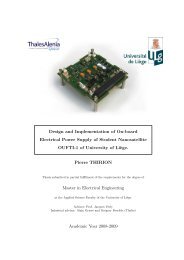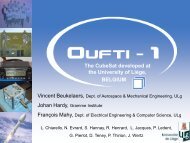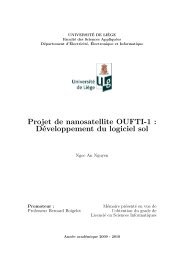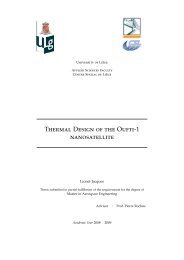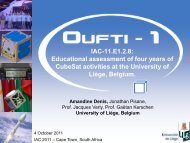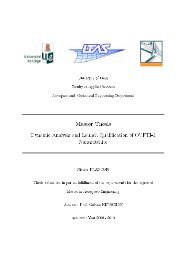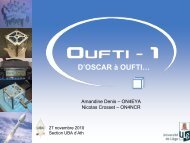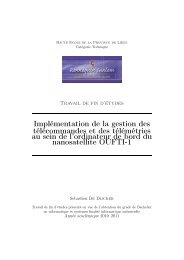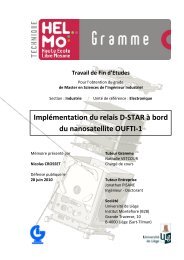Mission Design for the CubeSat OUFTI-1
Mission Design for the CubeSat OUFTI-1
Mission Design for the CubeSat OUFTI-1
You also want an ePaper? Increase the reach of your titles
YUMPU automatically turns print PDFs into web optimized ePapers that Google loves.
CHAPTER2THE LEODIUM PROJECTThe LEODIUM Project is a project involving <strong>the</strong> University of Liège and LiègeEspace, a consortium of space industries and research centers in <strong>the</strong> Liège regionwith <strong>the</strong> goal of increase <strong>the</strong> cooperation between <strong>the</strong> members and to promote<strong>the</strong> space activity.LEODIUM is <strong>the</strong> Latin name of Liège and stands <strong>for</strong> Lancement En Orbitede Démonstations Innovantes d’une Université Multidisciplinaire (Launch intoOrbit of Innovative Demonstrations of a Multidisciplinary University). Theproject started in 2005 when Mr. Pierre Rochus, president of Liège Espace andDeputy General Manager <strong>for</strong> Space Instrumentation of <strong>the</strong> Liège Space Center,was charged with <strong>the</strong> training of students to <strong>the</strong> design of miniaturized satellites.Some possible scenarios to involve students in <strong>the</strong> design of a space mission were<strong>for</strong>eseen and each one had its advantages and drawbacks:• <strong>Design</strong> of a <strong>CubeSat</strong> or of a Nanosatellite: quick and relatively simple butwith a scientific payload not really efficient due to <strong>the</strong> low mass and poweravailable.• <strong>Design</strong> of a Microsatellite: very interesting on <strong>the</strong> scientific point of viewbut requiring much more time and economical resources.• Participation to <strong>the</strong> design of a space instrument among a professionalteam: interesting mission but less possibility to actively participate.The project started with <strong>the</strong> participation in <strong>the</strong> Student Space Exploration andTechnology Initiative (SSETI) of <strong>the</strong> European Space Agency: <strong>the</strong> Universityof Liège took part in <strong>the</strong> European Student Earth Orbiter (ESEO) designing15



